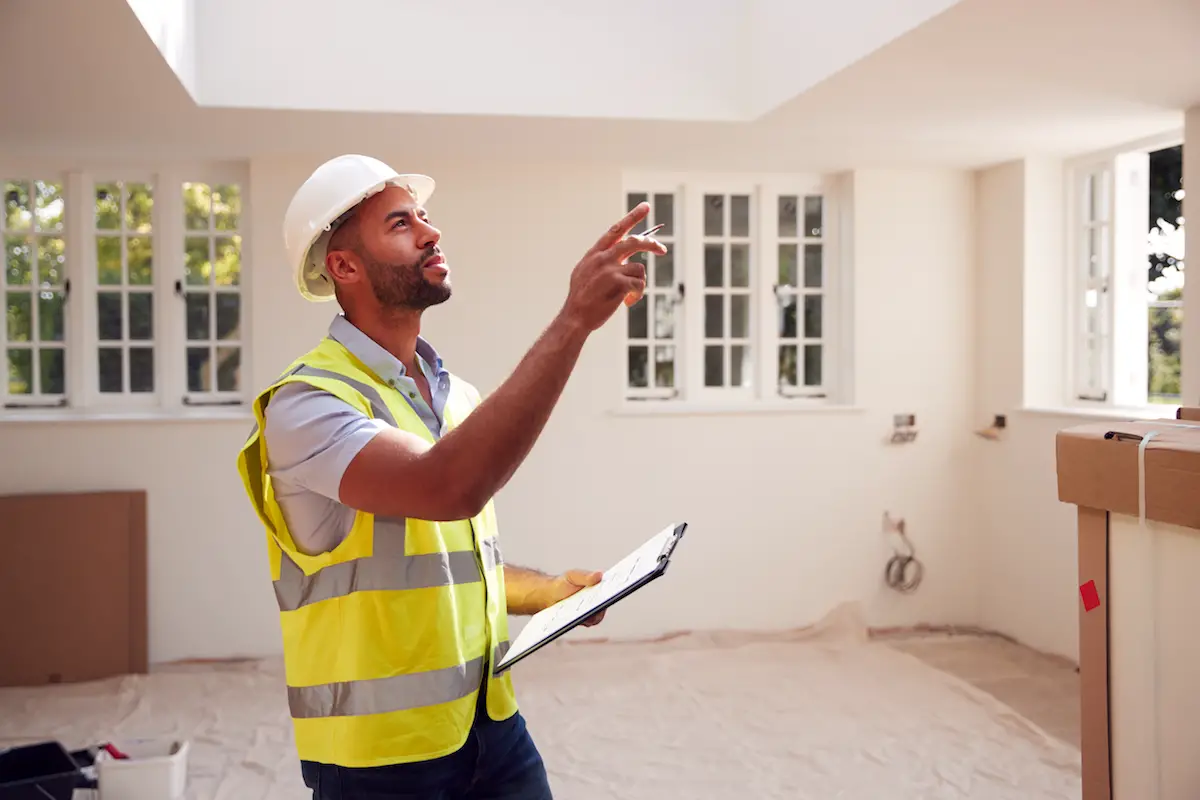Home>Home Maintenance>How To Start A Home Inspection Business


Home Maintenance
How To Start A Home Inspection Business
Modified: August 17, 2024
Learn the essential steps to start your own home inspection business and offer expert home maintenance services. Start your entrepreneurial journey today!
(Many of the links in this article redirect to a specific reviewed product. Your purchase of these products through affiliate links helps to generate commission for Storables.com, at no extra cost. Learn more)
Introduction
Welcome to the exciting world of home inspection business! If you have a passion for homes and a keen eye for detail, starting a home inspection business can be a fulfilling and profitable venture. As a home inspector, you will play a crucial role in helping homeowners and potential buyers understand the condition of their properties. Your expertise will provide them with valuable insights and recommendations for maintenance or repairs.
In this comprehensive guide, we will walk you through the essential steps to start your own home inspection business. From researching the industry to developing marketing strategies, we will cover everything you need to know to establish a successful and thriving business.
Before we dive in, it’s important to note that starting a home inspection business requires a strong foundation of knowledge in home maintenance and construction. While this guide will provide you with the necessary guidance, it is crucial to continually enhance your understanding of home systems, building codes, and industry best practices.
Are you ready to embark on this rewarding journey? Let’s get started!
Key Takeaways:
- Research and understand the home inspection industry to identify market demand, competition, and target audience. Join professional organizations and stay updated on industry standards to establish credibility and success.
- Provide exceptional customer service by communicating clearly, conducting thorough inspections, and continuously improving expertise. Build lasting relationships, seek feedback, and resolve issues with integrity to create loyal clients and a reputable business.
Read more: How To Start An Air Conditioning Business
Step 1: Research and Understand the Home Inspection Industry
Before diving into the world of home inspection, it is crucial to thoroughly research and understand the industry. This step will provide you with valuable insights into the market demand, competition, and industry trends.
Start by gathering information about the services offered by other home inspection businesses in your area. Take note of their pricing, service offerings, and target market. Assess the competition and identify gaps in the market that you can fill with your unique skills and expertise.
Additionally, familiarize yourself with the local regulations and requirements for home inspectors. Each region may have specific licensing and certification requirements that you need to fulfill. Research the educational requirements and training programs available to equip yourself with the necessary knowledge and credentials.
Attending industry conferences, workshops, and trade shows can also be beneficial. These events provide valuable networking opportunities and give you the chance to interact with seasoned professionals in the field. By staying updated on the latest industry standards and advancements, you can ensure that your skills and knowledge remain relevant and up-to-date.
As part of your research, consider joining professional organizations such as the American Society of Home Inspectors (ASHI) or the National Association of Home Inspectors (NAHI). These organizations provide access to resources, training materials, and networking opportunities that can greatly contribute to your professional development and credibility.
Lastly, take the time to understand your target market. Identify the demographics and the specific needs of your potential clients. Research the types of homes in your area, whether it’s older homes requiring renovation or newer construction that need routine inspections. Understanding your target market will help you tailor your services and marketing strategies to effectively reach and attract your ideal customers.
By thoroughly researching and understanding the home inspection industry, you are setting the foundation for a successful business. This knowledge will not only guide your decision-making process but also position you as a trusted and knowledgeable expert in the field.
Step 2: Determine the Legal and Licensing Requirements
Before officially launching your home inspection business, it is crucial to understand and comply with the legal and licensing requirements in your area. Operating without the necessary permits and licenses can lead to legal consequences and jeopardize the credibility of your business.
Start by researching the specific licensing requirements for home inspectors in your jurisdiction. Some regions may require you to obtain a professional license or certification, while others may have different regulations in place. Visit your local government websites or contact the appropriate regulatory agency to gather information about the specific requirements.
In some cases, obtaining a home inspection license may require a certain level of education or completion of a training program. Research the available programs and courses that can provide you with the necessary knowledge and qualifications. Consider enrolling in a recognized training program or earning certifications from reputable organizations such as the International Association of Certified Home Inspectors (InterNACHI).
In addition to licensing, you may need to register your business with the appropriate authorities. This often involves obtaining a business license or registering your business as a sole proprietorship, partnership, or limited liability company (LLC). Consult with a legal professional or a business advisor to determine the most appropriate structure for your home inspection business.
It is also important to understand the legal liabilities and obligations associated with operating a home inspection business. Acquire professional liability insurance coverage to protect yourself and your clients in the event of errors or omissions during inspections. Consult with an insurance professional to determine the type and amount of coverage required for your specific business needs.
Finally, familiarize yourself with any other legal requirements that may apply to home inspectors. This includes adhering to ethical standards, maintaining client confidentiality, and following local building codes and regulations. Staying in compliance with all legal requirements will not only protect your business but also establish trust and credibility with your clients.
By thoroughly understanding and fulfilling the legal and licensing requirements, you can operate your home inspection business confidently and legally. Take the time to research and consult with professionals to ensure that you are compliant with all the necessary regulations in your area.
Step 3: Create a Business Plan
A well-crafted business plan serves as the roadmap for your home inspection business. It outlines your goals, strategies, and financial projections, providing a clear direction for your business and helping you make informed decisions. Here are the key components to include in your business plan:
1. Executive Summary: This section provides a high-level overview of your business, highlighting key information such as your mission statement, target market, and competitive advantage.
2. Company Description: Describe your home inspection business in detail, including the services you offer, your target market, and the unique value proposition that sets you apart from competitors.
3. Market Analysis: Conduct a comprehensive analysis of the market, identifying your target audience, competitors, and market trends. Determine the demand for home inspection services in your area and outline your strategies to reach and attract clients.
4. Organization and Management: Outline the structure of your business, including the roles and responsibilities of key team members. If you are starting as a one-person operation, detail your qualifications and experience in the home inspection industry.
5. Services and Pricing: Clearly define the range of services you will offer as a home inspector, including pre-purchase inspections, maintenance inspections, and specialized services. Determine your pricing strategies, taking into consideration the market competition and the value you provide to clients.
6. Marketing and Sales: Develop a marketing plan to promote your business and attract clients. Identify your target audience and outline strategies such as online marketing, networking, and referral programs. Establish a sales process for converting leads into paying customers.
7. Financial Projections: Create financial forecasts, including startup costs, revenue projections, and expenses. Consider factors such as equipment purchases, marketing expenses, insurance premiums, and ongoing professional development costs. This will help you assess the financial feasibility of your business and plan for future growth.
8. Operations: Outline the day-to-day operations of your home inspection business, including scheduling inspections, preparing inspection reports, and managing client communications. Consider implementing efficient systems and processes to streamline your operations and ensure a smooth workflow.
9. Risk Management: Identify potential risks and challenges that may arise in your business, such as legal liabilities, inaccurate inspections, or fluctuations in market demand. Develop strategies to mitigate these risks and establish protocols to ensure the highest level of professionalism and customer satisfaction.
10. Exit Strategy: Although it may seem premature, having an exit strategy in place is important for long-term planning. Consider your future goals, whether it’s expanding the business, selling it, or transitioning to retirement. Having a plan in place will guide your decision-making process and help you stay focused on your long-term objectives.
Creating a comprehensive and well-thought-out business plan is essential for the success of your home inspection business. It helps you clarify your goals, make informed decisions, attract investors or secure financing, and navigate the challenges that may arise along the way. Take the time to research and carefully craft your business plan to set the foundation for a prosperous future.
Step 4: Set Up Your Home Inspection Business
Now that you have a solid business plan in place, it’s time to set up your home inspection business and establish a professional presence in the industry. Here are the key steps to consider:
1. Choose a Business Name: Select a unique and memorable name for your home inspection business. Make sure it reflects your services and resonates with your target market. Check for domain name availability to secure your online presence.
2. Register Your Business: Register your business with the appropriate local and state authorities. Determine the legal structure of your business, whether it’s a sole proprietorship, partnership, or LLC. Obtain the necessary permits and licenses required for operating a home inspection business in your area.
3. Set Up a Business Bank Account: Open a separate bank account for your business to keep your personal and business finances separate. This will simplify bookkeeping and ensure accurate financial records.
4. Obtain a Tax ID Number: Apply for a Tax ID number (EIN) from the IRS. This will be used for tax purposes and is often required for business transactions, hiring employees, or opening business credit accounts.
5. Choose Professional Tools and Software: Invest in professional tools and equipment for conducting home inspections. This includes moisture meters, thermal imaging cameras, carbon monoxide detectors, and other essential tools. Explore specialized software or inspection report templates that will help you efficiently generate comprehensive inspection reports.
6. Develop a Professional Website: Create a professional website that showcases your services, expertise, and contact information. Include a clear and concise description of your services, testimonials from satisfied clients, and any certifications or affiliations you hold. Make sure your website is mobile-friendly and optimized for search engines.
7. Establish Pricing and Payment Policies: Determine your pricing structure for different types of inspections and clearly communicate it to clients. Decide on payment options, such as accepting credit cards or electronic transfers, and establish clear payment terms and policies.
8. Design Marketing Materials: Create professional marketing materials, such as business cards, brochures, and flyers. These materials should clearly convey your services, contact information, and any unique selling points that set your business apart. Distribute these materials in targeted areas or collaborate with local real estate agents to promote your services.
9. Set Up Appointment Scheduling: Implement a scheduling system to manage appointments effectively. Consider using online scheduling software that integrates with your website and allows clients to book appointments conveniently.
10. Establish Client Communication Systems: Set up systems for efficient client communication, such as email templates for appointment confirmation and follow-ups. Consider using customer relationship management (CRM) software to manage client information and streamline communication.
By setting up your home inspection business with professionalism and attention to detail, you are positioning yourself for success in the industry. Remember to continually assess and refine your processes to ensure exceptional service delivery and customer satisfaction.
Read more: How To Start An Insulation Business
Step 5: Develop Marketing and Advertising Strategies
To establish a strong presence in the home inspection industry and attract clients, it’s essential to develop effective marketing and advertising strategies. Here are some key steps to consider:
1. Define Your Target Market: Determine your ideal clients and understand their needs and preferences. Are you targeting first-time homebuyers, real estate agents, or homeowners looking for maintenance inspections? By identifying your target market, you can tailor your marketing efforts to reach the right audience effectively.
2. Create a Strong Brand Identity: Develop a compelling brand identity that reflects your professionalism, expertise, and unique value proposition. This includes designing a professional logo, defining your brand voice and visual elements, and creating a consistent brand image across all marketing channels.
3. Build an Online Presence: In today’s digital age, having a strong online presence is crucial for marketing your home inspection business. Create a professional website that is search engine optimized (SEO) to improve visibility in online searches. Use social media platforms to share informative content, engage with potential clients, and build your reputation as an industry expert.
4. Content Marketing: Produce valuable and educational content that showcases your knowledge, expertise, and the importance of home inspections. This can include blog articles, e-books, videos, and infographics. Share this content on your website, social media platforms, and industry forums to position yourself as the go-to resource for home inspection advice.
5. Cultivate Relationships with Real Estate Agents: Real estate agents often play a significant role in referring home inspectors to their clients. Establish relationships with local agents by attending networking events, offering to provide educational seminars on home inspections, and providing exceptional service when working with their clients. By becoming a trusted partner for real estate agents, you can gain valuable referrals and build a strong client base.
6. Online Reviews and Testimonials: Encourage satisfied clients to leave online reviews and testimonials on your website, social media pages, and industry-specific review platforms. Positive reviews and testimonials can significantly impact your reputation and credibility, helping to attract new clients.
7. Utilize Local Advertising: Explore local advertising opportunities, such as placing ads in local newspapers or magazines, sponsoring community events, or advertising on billboards. Tailor your advertising efforts to target homeowners and potential homebuyers in your area.
8. Network and Referral Programs: Network with professionals in related industries, such as real estate agents, contractors, and insurance agents. Build relationships and establish referral programs to generate leads and expand your client base.
9. Attend Home Shows and Industry Events: Participate in home shows, industry conferences, and community events to showcase your expertise and connect with potential clients. Consider offering free mini-inspections or hosting informational sessions to attract attendees’ attention.
10. Monitor and Measure: Continually monitor and measure the effectiveness of your marketing efforts. Track website analytics, social media engagement, and lead generation to identify areas for improvement and refine your strategies.
Remember, consistency is key in marketing your home inspection business. Continually refine your strategies based on feedback and evaluate the effectiveness of different channels to ensure you are reaching your target audience effectively. By implementing effective marketing and advertising strategies, you can enhance your visibility, attract new clients, and establish a strong reputation in the industry.
Tip: Research your local regulations and licensing requirements for home inspectors. Understanding the legalities and necessary qualifications is crucial for starting a successful home inspection business.
Step 6: Build a Professional Network
Building a strong professional network is vital for success in the home inspection industry. Developing connections with other professionals can lead to valuable referrals, collaborative partnerships, and a broader client base. Here are some steps to help you build a professional network:
1. Join Professional Organizations: Become a member of industry-specific organizations such as the American Society of Home Inspectors (ASHI) or the National Association of Home Inspectors (NAHI). These organizations offer networking opportunities, educational resources, and access to industry events where you can connect with other professionals.
2. Attend Industry Conferences and Events: Participate in home inspection conferences, trade shows, and events. These gatherings provide opportunities to network with fellow home inspectors, suppliers, and professionals from related industries. Be proactive in engaging with others, exchanging contact information, and building relationships.
3. Collaborate with Real Estate Agents: Forge connections with local real estate agents who regularly work with homebuyers. Offer your expertise and build trust by providing exceptional service and valuable advice. Establishing strong relationships with real estate professionals can lead to a consistent stream of referrals.
4. Engage Contractors and Service Providers: Reach out to contractors, plumbers, electricians, and other professionals involved in home maintenance and repairs. These individuals often come in contact with homeowners who may require inspection services. Building a referral network with trusted service providers can be mutually beneficial.
5. Attend Local Networking Events: Look for networking events in your community where you can connect with other professionals. Chambers of commerce, business associations, and local meetups are great places to meet professionals from various industries. Bring your business cards, engage in conversations, and follow up with potential connections afterward.
6. Offer Educational Workshops: Organize educational workshops or seminars for homeowners, real estate agents, and other professionals. Share your knowledge and insights about home inspections, maintenance, and common issues. Providing value through education helps build credibility and demonstrates your expertise.
7. Collaborate with Home Service Providers: Consider collaborating with professionals who offer complementary services, such as home stagers, interior designers, or home organization experts. By referring clients to each other, you not only provide added value but also expand your reach and potential client base.
8. Utilize Online Networking Platforms: Make use of online networking platforms such as LinkedIn and industry-specific forums. Connect with professionals, join relevant groups, and actively engage in discussions. Offer advice and insights, and contribute to the community. This can help expand your network beyond your local area.
9. Stay in Touch: Regularly communicate and stay in touch with your professional contacts. Send periodic updates, relevant articles, or helpful resources to maintain the connection. Building lasting relationships requires consistent effort and nurturing.
10. Provide Exceptional Service: Above all, the best way to build a professional network is by delivering exceptional service to your clients. Word-of-mouth recommendations are powerful, and satisfied clients can become your strongest advocates. Strive to exceed expectations, provide thorough inspections, and offer exceptional customer service.
Remember, building a professional network takes time and effort. Be authentic, genuine, and approachable. Focus on creating mutually beneficial relationships that can support and enhance your home inspection business in the long run.
Step 7: Acquire the Necessary Equipment and Tools
Acquiring the necessary equipment and tools is essential for conducting thorough and accurate home inspections. Having the right tools not only enhances your ability to assess the condition of a house but also instills confidence in your clients. Here are some considerations when acquiring the necessary equipment and tools:
1. Basic Inspection Tools: Start with the fundamental tools that every home inspector needs, such as a flashlight, tape measure, ladder, and screwdriver set. These tools will enable you to examine various components of the home, including electrical outlets, plumbing fixtures, and access points.
2. Diagnostic Tools: Invest in diagnostic tools that help you identify potential issues that may be hidden to the naked eye. Some essential diagnostic tools include a moisture meter to detect hidden leaks or areas of high humidity, a thermal imaging camera to identify insulation gaps or electrical issues, and a carbon monoxide detector to assess indoor air quality.
3. Safety Equipment: Ensure your safety during inspections by equipping yourself with personal protective equipment (PPE). This may include gloves, safety goggles, a dust mask, and sturdy footwear. Additionally, consider investing in a respirator for situations where there may be exposure to mold or other harmful substances.
4. Reporting and Documentation Tools: Choose software or templates that streamline the generation of inspection reports. Look for solutions that allow you to include photos, videos, and detailed descriptions of identified issues. Efficient reporting tools not only save time but also enhance the professionalism of your reports.
5. Specialty Tools: Depending on the specific services you offer, you may need specialty tools. For example, if you offer radon testing, you will need a radon detector. If you provide sewer line inspections, consider investing in a sewer camera. Assess your services and determine any specialized tools required to deliver comprehensive inspections.
6. Equipment Quality and Calibration: Invest in high-quality equipment that is reliable and durable. Remember that your tools are an investment in the success and reputation of your business. Regularly calibrate and maintain your tools to ensure accurate measurements and optimal performance.
7. Mobile Device and Inspection Software: Consider utilizing a mobile device, such as a tablet or smartphone, for on-site documentation and access to inspection software. Choose inspection software that allows you to input data efficiently and generate reports seamlessly. Integration with digital tools can streamline your process and improve the overall efficiency of your inspections.
8. Continuous Learning and Upgrades: Stay up to date with industry advancements and trends. Attend conferences, workshops, and training sessions to learn about new tools and technologies that can improve your inspection process. As the industry evolves, be prepared to upgrade your equipment to stay competitive and provide the best service to your clients.
Remember, the quality and accuracy of your inspections heavily rely on the tools and equipment you use. Make thoughtful investments in reliable tools, regularly maintain and calibrate them, and stay informed about industry advancements. By having the necessary equipment, you can confidently conduct comprehensive inspections and deliver valuable insights to your clients.
Step 8: Establish Pricing and Payment Policies
Establishing clear pricing and payment policies is crucial for running a successful home inspection business. It ensures transparency, consistency, and fair value for your services. Here are some factors to consider when determining your pricing and payment policies:
1. Research Market Rates: Research the current market rates for home inspections in your area. Consider factors such as the size and age of the property, the complexity of the inspection, and any additional services you offer. This will give you a baseline for setting competitive pricing.
2. Structure Your Pricing: Determine how you will structure your pricing, whether it’s based on the square footage of the property, the number of rooms, or a flat fee. Each pricing structure has its advantages, so choose the one that aligns best with your business goals and the needs of your target market.
3. Additional Services: Consider offering additional services such as radon testing, mold inspections, or pest inspections. Determine the pricing for these services separately, taking into account the equipment and expertise required.
4. Value-Added Packages: Create value-added packages that bundle multiple services together. For example, you could offer a comprehensive inspection package that includes a general home inspection, radon testing, and thermal imaging. This allows you to provide more value to clients and potentially increase your revenue per inspection.
5. Payment Terms and Options: Clearly outline your payment terms and options for clients. Specify the preferred method of payment, whether it’s cash, check, credit card, or online payment platforms. Consider offering flexibility by accepting multiple payment methods to accommodate clients’ preferences.
6. Deposit or Retainer: Determine if you require a deposit or retainer fee upfront to secure the inspection appointment. This can protect your time and effort in case of last-minute cancellations or no-shows.
7. Cancellation and Rescheduling Policies: Establish clear policies regarding cancellations and rescheduling. Define any fees or penalties that may be applicable if a client cancels or reschedules within a certain timeframe. Communicate these policies to clients upfront to manage expectations.
8. Terms and Conditions: Develop a terms and conditions agreement that clearly outlines the scope of your services, the limitations of the inspection, and any disclaimers. This protects both you and the client by setting clear expectations and preventing any misunderstandings.
9. Discounts and Referral Programs: Consider offering discounts for bundled services, repeat clients, or referrals. Implement a referral program where satisfied clients can earn incentives for referring new business to you. This encourages word-of-mouth marketing and fosters loyalty.
10. Professionalism and Value: Price your services competitively, but also consider the value you provide to clients. Emphasize your expertise, professionalism, and attention to detail when communicating your pricing. Clearly articulate the benefits they will receive from choosing your services over your competitors’.
Remember, pricing and payment policies should be fair, transparent, and reflective of the value you offer as a home inspector. Take time to assess your costs, research the market, and understand the needs of your target audience. By establishing clear and reasonable pricing and payment policies, you can build trust with clients and operate a financially successful home inspection business.
Step 9: Obtain Insurance Coverage
Obtaining insurance coverage is a critical step in protecting your home inspection business and mitigating potential risks and liabilities. Insurance provides financial security and peace of mind, ensuring you are covered in the event of errors, omissions, or unforeseen circumstances. Here are some key insurance coverages to consider:
1. General Liability Insurance: General liability insurance protects your business against claims of bodily injury or property damage that may occur during inspections. It covers legal fees, medical expenses, and property damage costs. This coverage is essential for protecting yourself and your clients in case of accidents or mishaps.
2. Professional Liability Insurance: Also known as errors and omissions (E&O) insurance, professional liability insurance covers you in the event a client alleges negligence or mistakes in your inspection. It provides coverage for legal defense costs and any damages that may arise from errors or omissions during your professional services.
3. Workers’ Compensation Insurance: If you have employees or subcontractors, workers’ compensation insurance is necessary. It provides coverage for medical expenses and lost wages if an employee or subcontractor is injured while working on the job.
4. Business Property Insurance: Protect your business assets, including your equipment, tools, and office space, with business property insurance. This coverage helps you replace or repair damaged or stolen items, ensuring minimal disruption to your operations.
5. Cyber Liability Insurance: As a home inspector, you may store sensitive client information electronically. Cyber liability insurance protects against data breaches, cyberattacks, or unauthorized access to client data. This coverage can cover legal expenses and assist in managing reputational damage.
6. Commercial Auto Insurance: If you use a vehicle for business purposes, such as traveling to inspections or transporting equipment, commercial auto insurance is necessary. It covers damages to your vehicle and liability for bodily injury or property damage caused by accidents.
7. Bonding: Some states or regulators may require home inspectors to be bonded. Bonding provides financial protection to clients in case of financial loss due to dishonest or fraudulent actions by the inspector.
8. Umbrella Insurance: Consider an umbrella insurance policy that supplements your other liability coverages. Umbrella insurance provides additional coverage above the limits of your primary policies, offering extra protection against large claims or lawsuits.
9. Review Coverage Limits and Deductibles: Ensure your insurance policy provides adequate coverage limits for potential claims and liabilities. Evaluate the deductibles carefully to choose an amount that aligns with your risk tolerance and financial capabilities.
10. Consult an Insurance Professional: Work with an insurance professional with experience in the home inspection industry. They can assess your specific needs, recommend appropriate coverages, and provide guidance on policy limits and exclusions.
Insurance coverage is a critical investment to safeguard your home inspection business against unforeseen risks and liabilities. Take the time to evaluate your insurance needs, review policy options, and consult with an insurance professional. By obtaining comprehensive coverage, you can protect your business, your clients, and your professional reputation.
Step 10: Provide Exceptional Customer Service
Providing exceptional customer service is a key factor in the success of your home inspection business. Satisfied clients not only become loyal customers but also serve as valuable referrals to new potential clients. Here are some strategies to provide exceptional customer service:
1. Clear Communication: Maintain clear and open communication with your clients from the initial inquiry to the completion of the inspection. Respond to inquiries promptly, provide thorough explanations of your services, and set clear expectations for the inspection process.
2. Professionalism: Demonstrate professionalism in all aspects of your business. Be punctual, presentable, and approachable. Show respect for the property and homeowners during inspections, ensuring a positive and comfortable experience for your clients.
3. Thorough and Accurate Inspections: Conduct thorough and detailed inspections, leaving no stone unturned. Take the time to explain your findings to clients, highlighting both positive aspects and potential concerns. Provide clear, concise, and jargon-free inspection reports that are easy for clients to understand.
4. Exceptional Expertise: Continually enhance your knowledge and expertise in home inspections. Stay updated with industry standards, building codes, and emerging technologies. Attend training sessions, conferences, and workshops to expand your knowledge and continuously improve your skills.
5. Customer Education: Educate your clients about home maintenance, common issues, and the importance of regular inspections. Provide tips and recommendations to help them enhance the value, safety, and functionality of their homes. Empower your clients with knowledge to make informed decisions.
6. Responsive and Timely Service: Be responsive and accessible to your clients’ needs. Answer phone calls and emails promptly, address any concerns or questions they may have, and provide timely follow-ups after the inspection. This level of attentiveness builds trust and demonstrates your commitment to their satisfaction.
7. Going the Extra Mile: Look for ways to exceed customer expectations. Offer additional resources or referrals for specific maintenance or repair needs. Consider providing post-inspection support, such as answering questions or providing clarification on the report findings. Going above and beyond enhances the overall customer experience.
8. Solicit Feedback: Actively seek feedback from your clients to continuously improve your services. Send surveys or request reviews to gather insights on their experience. Use the feedback to identify areas for improvement and make necessary adjustments to enhance your service delivery.
9. Relationship Building: Build lasting relationships with your clients by maintaining regular communications. Send personalized follow-ups, greetings on special occasions, or newsletters with helpful home maintenance tips. These actions reinforce your commitment to their satisfaction and keep your business top-of-mind.
10. Resolve Issues with Integrity: In the rare event of a client concern or dispute, handle it with honesty, integrity, and professionalism. Address the issue promptly and find a mutually agreeable resolution. Taking accountability and demonstrating a willingness to make things right can turn a negative experience into a positive one.
Remember, exceptional customer service is the foundation for building a strong and reputable home inspection business. By consistently providing outstanding service, you create loyal clients who will not only continue to use your services but also refer others to you. Embrace a customer-centric approach and strive to exceed expectations in every interaction.
Conclusion
Congratulations on reaching the end of this comprehensive guide on starting a home inspection business. By following the steps outlined in this guide, you are well on your way to establishing a thriving and successful venture in the home maintenance industry.
Starting a home inspection business requires a combination of expertise, business acumen, and a commitment to exceptional customer service. Through careful research and understanding of the industry, obtaining the necessary licensing and insurance, and developing effective marketing strategies, you will position yourself as a trusted professional in the field.
Remember, success in the home inspection industry is not just about technical skills. It is equally important to focus on building strong relationships, providing exceptional customer service, and continuously improving your knowledge and expertise. By delivering thorough and accurate inspections, maintaining open communication with clients, and going the extra mile, you will create a distinguished reputation and secure long-term success.
As you embark on your home inspection business journey, remember to stay informed about industry advancements, seek continuous learning opportunities, and stay proactive in adapting to changes and industry best practices. Embrace challenges as opportunities for growth and never lose sight of the importance of consistently providing exceptional service.
Finally, always remember the impact you have on homeowners and potential buyers. Your expertise and insights give them the knowledge to make informed decisions about their most significant investment, their homes. By embracing this responsibility and delivering exceptional service, you will not only run a successful business but also contribute positively to the well-being and satisfaction of your clients.
So, go forth with confidence, passion, and a commitment to excellence. Your home inspection business awaits, ready for you to make a meaningful impact in the lives of homeowners and the home maintenance industry as a whole. Best of luck on your entrepreneurial journey!
Frequently Asked Questions about How To Start A Home Inspection Business
Was this page helpful?
At Storables.com, we guarantee accurate and reliable information. Our content, validated by Expert Board Contributors, is crafted following stringent Editorial Policies. We're committed to providing you with well-researched, expert-backed insights for all your informational needs.














0 thoughts on “How To Start A Home Inspection Business”